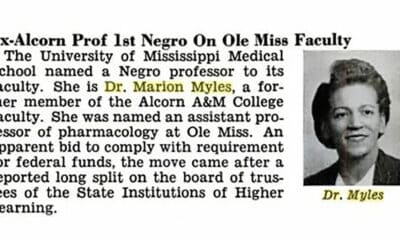Mississippi Today
Speaker White frustrated by ‘crickets’ from Senate on tax plan: Legislative recap

Last week, with the legislative session clock ticking towards midway, House Speaker Jason White was growing more frustrated with the “crickets” he’s heard from his Republican Senate counterpart Lt. Gov. Delbert Hosemann on the House’s sea-change tax overhaul plan.
“It’s frustrating for us to try to move something this big, and at the other end of the building, they just refuse to engage,” White said in an interview with Mississippi Today as the three-month session nears the halfway mark. “… There’s a plan to have a plan, but, nobody’s seen the plan …
“To just get crickets on the whole thing, that just doesn’t work.”
White and the GOP majority House — and Republican Gov. Tate Reeves — have made no secret they believe eliminating the income tax is priority No. 1 for this session. The House worked through the summer on a plan, holding public hearings, a public summit and providing details of its plan as the session started.
House Bill 1 — which contains the House plan to eliminate the income tax over more than a decade, cut the sales tax on groceries, raise the sales tax to 8.5% and place a new 5% — has been public about a month. It was passed by the full House and sent to the Senate on Jan. 17. The plan would attempt to address a long-running shortfall in highway maintenance funding and help shore up the state’s government employee retirement system.
Hosemann and the GOP majority Senate leadership have indicated they, too, have a sea-change tax overhaul coming. But so far Hosemann has outlined only a few particulars he expects will be in the Senate plan, and some of his lieutenants have criticized parts of the House proposal. But reportedly, through recent days, the Senate plan is still being devised, debated and tweaked behind closed doors. Senate leaders indicated it will be unveiled this week.
White said such monumental policy shouldn’t be done late in a hectic session, and there should be more transparency for the public.
“We have Republican leadership in all three place, the Governor’s Mansion, the House and in the Senate,” White said. “The answer can’t be, we’re looking at it in a small group behind a closed door, and say, ‘We’ll let you know when we come up with something’ … I’m so frustrated with the process.”
White said there appears to be a pattern of Senate leadership “hiding the ball,” and “running out the clock” on parlaying with the House on major policies. He noted similar issues in overhauling the state’s education funding formula — in which the House and Senate finally reached agreement late last year — and Medicaid expansion, which failed after the Senate delayed, then refused major compromise.
“Is the public going to buy this on a month’s notice?” White said. He speculates the governor could call lawmakers back into special session if no major tax plan is agreed to.
Some Senate leaders have said they are being more deliberate with monumental tax cuts or policy changes, and having bean counters thoroughly vet various scenarios. The Senate, by design, is supposed to be the more “deliberative” body in Mississippi’s bicameral Legislature.
“Well, let’s deliberate,” White said. “… But the answer can’t just be, ‘No.’ The answer could be, you’re wrong and here’s why … But to have that you have to have engagement, and not do things in a flurry the last 10 days of a session … We’re not interested in a small piece of a tax cut while not addressing other issues …
“This is the issue of the session,” White said, “and it can bring all the rest of the stuff to a halt.”
WATCH: Political Reporter Michael Goldberg breaks down the school choice debate.
Quote of the Week
“The chairman acted like he couldn’t smell what I was stepping in, but I think you and I are on the same page,” — Rep. Bryant Clark, D-Pickens, to Rep. Jansen Owen, R-Poplarville, during a House floor debate.
In Brief
Both chambers pass bans on public camping
The House and Senate each passed bills after lengthy floor debates this week that would prohibit people from “camping” on public property.
House Bill 1203 and Senate Bill 2334 would make it a misdemeanor offense to camp on places such as streets, sidewalks and near government buildings, with penalties ranging from fines to jail time for repeated violations of the law.
The measures are designed to prevent the growth of sprawling encampments where homeless people live. Proponents, mostly Republicans, argue such encampments are a public nuisance and dissuade people from seeking mental health support and other social services. Opponents, mostly Democrats, say the measures criminalize homelessness..
— Michael Goldberg
Bill would protect people reporting sex crimes
The House Judiciary B Committee on Tuesday passed legislation that would give immunity to people who possess alcohol while underage or small amounts of drugs if they report instances of sexual abuse or sexual assault to law enforcement authorities.
The legislation, authored by Rep. Dana McLean, R-Columbus, passed the committee and can now be considered by the full House. McLean said the intent of the legislation was to give some level of protection to college students at a party where drugs were present who might be worried they would receive punishment from law enforcement if they were survivors or witnesses to sexual assault.
“We want to be able to protect these witnesses in case they’re concerned about an underlying arrest,” said McLean, who has advocated for reforms to Mississippi’s sexual assault laws for years. — Taylor Vance
Bill would ban cell phones in class
A measure that would ban students using cell phones in Mississippi public school classrooms is pending before the full Senate, with support from Lt. Gov. Delbert Hosemann.
Similar measures have been implemented or are being considered in many states, with experts saying the use of cell phones and social media during school is detrimental to learning and a distraction.
SB 2145 authored by Sen. Briggs Hopson III, passed the Senate Education Committee and is pending in the full Senate. It would provide exceptions for students that require a cell phone for health or safety reasons. The measure would sanction school systems that do not adopt strict cell phone policies by 2026 by withholding state funding. — Geoff Pender
Wine shipment measure advances
The full Senate will consider a measure to allow Mississippians to have wine shipped to their homes after the Finance Committee passed SB 2145, authored by Sen. Walter Michel.
But lawmakers added a “reverse repealer” to the bill, to ensure more debate before it could be passed into law. Similar measures have been debated and killed for many years.
The bill would require a wine shipper to get a permit from the state Department of Revenue and pay taxes, and a recipient would have to show ID proving they are over 21. — Geoff Pender
Measure would create domestic violence board
A bill to create a board reviewing domestic violence deaths passed the House Public Health Committee last week.
The goal of HB 1551 is to uncover trends of domestic fatalities, which would help shelter providers find ways to help victims, and for the review board to make policy suggestions to lawmakers.
This board would be housed within the State Department of Health. Bill author Rep. Fabian Nelson, D-Bryam, said as domestic incidents are on the rise, it’s “time for us to do something about it.” — Mina Corpuz
Special election set to replace Branning
Gov. Tate Reeves has set a special election for April 15 to fill the vacancy in Senate District 18, which includes Leake, Neshoba, and Winston counties.
The vacancy is from the resignation of Jennifer Branning after she was elected to the state Supreme Court.
The qualifying deadline to run for the special election is Feb. 24. — Mississippi Today
Senate panel approves vape registry
A measure to create a registry of approved electronic cigarette, or vaping, devices is pending before the Senate after it was approved by the Finance Committee. A similar measure was passed by the Senate but died last year.
Senate Finance Chairman Josh Harkins authored the bill, and said Louisiana and other states have similar registries, aimed at making sure only safe products are sold in Mississippi.
“We’ve all had stories of illegal products being sold in Mississippi,” Harkins said. The registry, if passed into law, would begin Sept. 1. — Geoff Pender
Lawmakers prep for Supreme Court redistricting, if judge orders
Legislature could address Supreme Court redistricting, if ordered by federal judge
The House passed a bill 116-1 that would allow the Legislature to change Mississippi’s Supreme Court districts if a federal judge, while lawmakers are in session, orders the districts to be redrawn.
Horan, a Republican from Grenada, passed a “dummy bill” to allow legislators to change the three districts if U.S. District Judge Sharion Aycock rules lawmakers have diluted Black voting strength by not drawing a districts that allow Black voters to elect judges of their choice.
Black voters across the state filed federal litigation against the state arguing the Mississippi’s Central Supreme Court District is unfairly drawn. Aycock has not issued a ruling in the pending litigation. — Taylor Vance
Bill would widen scope for advanced-practice nurses
A bill passed by the House Public Health Committee on to the full Senate this week would widen the scope of practice for nurse practitioners and certified registered nurse anesthetists.
The bill allows the two groups of advanced-practice registered nurses to practice independently – not under the supervision of a physician – after completion of 8,000 practice hours. It would also allow anesthesiology assistants to be licensed and regulated in Mississippi, though that group of providers would have to operate under an anesthesiologist.
House Bill 849 is authored by House Public Health and Human Services Chair Sam Creekmore, R-New Albany, and Rep. Clay Mansell, R-Clinton.
Currently, advanced practice registered nurses must enter into a collaborative agreement with a physician. Under the agreement, the advanced practice nurse must pay the physician with whom they are collaborating. These contracts can be expensive and sometimes have distance limitations, meaning nurses in rural areas may not be able to participate.
Physicians and the Mississippi State Medical Association have long said doing away with these agreements reduces the quality of patient care. — Kate Royals
By the Numbers
$1.7 billion
The amount of back child support owed for 159,826 children, according to lawmakers during debate over a bill to allow the state to garnish gambling winnings to collect from deadbeat parents.
Full Legislative Coverage
Mobile sports betting legalization passes Mississippi House
The state House approved legislation Monday for the second year in a row to legalize mobile sports betting, a move that puts Mississippi on track to join a growing number of states that allow online betting. Read the story.
Education Chairman says Senate doesn’t currently support easing public school transfers
Mississippi Senate Education Chairman Dennis DeBar, R-Leakesville, declined on Monday to advance a proposal that would have made it easier for students to transfer between public schools and said he doesn’t think such a proposal can currently pass the upper chamber. Read the story.
Campaign finance reports: Gubernatorial hopefuls Fitch, Hosemann, White neck-and-neck in fundraising
Annual campaign finance reports due Friday show the top potential contenders — at least to date — for Mississippi governor in 2027 were neck-and-neck in how much they raised last year. Read the story.
Rural Mississippi schools fight to attract and keep teachers amid shortages
Mississippi’s education system faces a critical teacher shortage, particularly in rural areas like Greene County, where school leaders struggle to recruit and retain experienced educators. Read the story.
Sea change in Mississippi taxation coming. Where is the Senate plan?
To his credit, House Speaker Jason White has been very transparent with the House plan, every jot and tittle of it before the public for weeks. House leaders held public hearings, even a public “summit” in the months leading up to this legislative session and received input from business, transportation and local government leaders. They openly broadcast details of their plan and were out the gates early in the session passing House Bill 1. Read the analysis.
Mississippi again turns down millions of dollars to feed low-income kids during summer months
Hundreds of thousands of eligible poor Mississippi children will miss out on grocery assistance this summer after the state missed the deadline to apply for the federal program for the second year in a row. Read the story.
Measures allowing former felons to regain voting rights clear House committees
Two measures allowing some people convicted of disenfranchising felony offenses to regain their voting rights passed a House committee on Tuesday, allowing the House to consider reforming one of the most strict felony disenfranchisement systems in the nation. Read the story.
Sending taxpayer money to private schools advances in Mississippi House
The move keeps alive a yearslong push from private school advocates and prompted concern among Democrats that the legislation could undermine public schools serving some of the state’s neediest students. Read the story.
House passes bill to make switching public K-12 school districts easier
The House on Thursday passed a bill to make it easier for K-12 students to transfer to other public schools outside their home districts, advancing a policy priority for House Speaker Jason White. Read the story.
‘This is a stupid bill’: Mississippi House advances DEI ban
Mississippi House Republican lawmakers advanced a bill that would shutter DEI programs in all of the state’s public schools, ban certain concepts from being taught in classrooms and dictate how schools define gender. Read the story.
Measures allowing former felons to regain voting rights clear House committees
Two measures allowing some people convicted of disenfranchising felony offenses to regain their voting rights passed a House committee on Tuesday, allowing the House to consider reforming one of the most strict felony disenfranchisement systems in the nation. Read the story.
Health Department cuts clinical services at some county clinics following insufficient funding from Legislature
After the Legislature failed to give the state health department the funding it needed to fully staff county health departments, some no longer offer clinical services and the agency may close others. Read the story.
Mississippi parents, owed $1.7 billion in child support, could collect gambling winnings
The Senate passed a bill that would allow the agency to collaborate with the state Gaming Commission to withhold cash winnings from people with outstanding child support. Read the story.
Podcast: The health care issues lawmakers are debating in 2025
Mississippi Today’s health team outlines the major health care issues the Mississippi Legislature is dealing with in the 2025 session. Listen to the podcast.
They want to send public funds to private schools, but they don’t want to let voters decide the issue
Proponents of spending public funds on private schools are not proponents of letting the people vote on the issue. Read the analysis.
This article first appeared on Mississippi Today and is republished here under a Creative Commons license.![]()
Mississippi Today
On this day in 1965
On this day in 1965
March 13, 1965

Dr. Marion Myles accepted a position at the University of Mississippi Medical Center. Three months later, the vice chancellor appointed her an assistant professor of pharmacology, the first Black American on the faculty.
Her appointment came over the objections of some members of the board of trustees of the state Institutions of Higher Learning.
Prior to accepting the appointment, Myles taught biology, botany, agronomy and zoology at several universities. An expert in plant physiology, she studied the effects of drugs and hormones on plant growth. She received a Carnegie Foundation Research Grant and was awarded research fellowships at the California Institute of Technology and at the Institute of Nuclear Studies at Oak Ridge National Laboratory in Tennessee.
The same year that the medical center appointed her, the center offered a residency slot to Dr. Aaron Shirley, the first Black resident.
This article first appeared on Mississippi Today and is republished here under a Creative Commons license.![]()
Mississippi Today
‘A good start’: Senate passes pharmacy benefit manager reform bill

The Senate passed a bill Wednesday that would increase the regulation and transparency of pharmacy benefit managers, which advocates argue will protect patients and independent pharmacists.
The legislation, authored by Sen. Rita Parks, R-Corinth, beefs up a House of Representatives bill focusing on the transparency of pharmacy benefit managers by adding language to tighten appeal procedures, bar the companies from steering patients to affiliate pharmacies and prohibit spread pricing – the practice of paying insurers more for drugs than pharmacists in order to inflate pharmacy benefit managers’ profits.
Parks said the bill, which passed 46-4, has the support of the House, which can now send it to the governor’s desk to sign or go to conference with the Senate to negotiate changes.
“This is the furthest we’ve been in two years,” said Parks. “We’re bringing fairness to the patient and to independent pharmacists.”
The bill’s passage came after a strong showing of support for reform from independent pharmacists, who have warned that if legislators do not pass a law this year to regulate pharmacy benefit managers, which serve as middlemen in the pharmaceutical industry, some pharmacies may be forced to close. They say that the companies’ low payments and unfair business practices have left them struggling to break even.
The Senate’s original bill died in the House, but the body revived most of its language by inserting it into a similar House bill, House Bill 1123, which was authored by House Speaker Jason White.
The Senate made several concessions in the most recent version of the legislation, including forgoing a provision that would have required pharmacy benefit managers to reimburse prescription discount card claims within seven days. These claims are currently paid within 60 to 90 days, which pharmacists argue is a burdensome timeframe.
The bill is a “good start” to real pharmacy benefit manager reform and transparency, said Robert Dozier, the executive director of the Mississippi Independent Pharmacy Association.
“The independent pharmacists are pleased with the current form of House Bill 1123,” he said. “They did not get everything they wanted, but they got what they needed.”
The bill also gives the Mississippi Board of Pharmacy more tools to conduct audits and requires drug manufacturers, pharmacy benefit managers and health insurers to submit data to the Mississippi Board of Pharmacy, which will be available to the public.
Sen. Jeremy England, R-Ocean Springs, said he is concerned the bill will lead to higher health insurance costs for employers, including the state itself, which provides health insurance to state employees.
Pharmacy benefit managers negotiate rebates, or cost savings, for employers, and some critics of pharmacy benefit manager reform argue that regulating the companies’ business practices will lead to higher insurance costs for employers.
England said that Mississippi employers stand to lose tens of millions of dollars and that regulation could deter new businesses from coming to the state.
“This language that we are trying to put into state law here goes too far, in fact it goes to the point where it could end up costing jobs,” he said.
A vote requested by England to determine if a fiscal note is necessary for the bill failed.
Parks said she disagreed that the bill would raise state health insurance costs and called England’s concerns a “scare tactic” meant to deter legislators from passing the bill.
England also proposed an amendment to the bill to remove self-funded insurance plans, or health plans in which employers assume the financial risk of covering employees’ health care costs themselves, from a section of the bill that prohibits pharmacy benefit managers from steering patients to specific pharmacies and interfering with their right to choose a particular pharmacy.
Self-funded health plans often use pharmacy benefit managers to administer prescription drug benefits and process claims.
Parks argued that excluding self-funded health plans from those guidelines would remove the fundamental protections the bill affords pharmacies and patients.
England’s amendment failed.
“Mississippi’s been a beacon in where we have stood with PBM,” Parks said. “We need to continue to be that beacon and not go backwards.”
This article first appeared on Mississippi Today and is republished here under a Creative Commons license.![]()
Crooked Letter Sports Podcast
Podcast: Raymond basketball coach Tony Tadlock joins to talk about high school basketball championships and this week’s SEC Tournament.

One of the state’s top basketball coaches, Tadlock overcame the loss of all five starters from last year’s championship team and losing his leading scorer this season, to win a second straight state championship and the seventh in school history. Tadlock talks about how he works with a 40-man basketball roster and maintaining a remarkable winning culture at Raymond.
Stream all episodes here.
This article first appeared on Mississippi Today and is republished here under a Creative Commons license.![]()
-

 News from the South - Oklahoma News Feed5 days ago
News from the South - Oklahoma News Feed5 days agoFeed the Children rolls out new program to help Oklahoma families
-

 News from the South - Oklahoma News Feed7 days ago
News from the South - Oklahoma News Feed7 days agoMarch 6,2025: Rain and snow on the way
-

 Mississippi Today6 days ago
Mississippi Today6 days agoJudge tosses evidence tampering against Tim Herrington
-

 News from the South - Texas News Feed5 days ago
News from the South - Texas News Feed5 days agoFifth Ward home robbed, caught on camera
-

 News from the South - North Carolina News Feed7 days ago
News from the South - North Carolina News Feed7 days agoSchool officials voice concerns as US Department of Education remains in limbo
-

 Mississippi Today4 days ago
Mississippi Today4 days agoMississippians honor first Black lawmaker since Reconstruction
-

 News from the South - North Carolina News Feed6 days ago
News from the South - North Carolina News Feed6 days ago6PM News on WRAL – Friday, March 7, 2025
-

 News from the South - Tennessee News Feed5 days ago
News from the South - Tennessee News Feed5 days agoImpact of cuts to the federal government












































